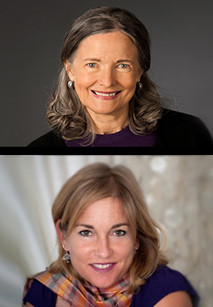 Helen LaKelly Hunt (top) and Emily Nielsen Jones (bottom) of Women Moving Millions.
Helen LaKelly Hunt (top) and Emily Nielsen Jones (bottom) of Women Moving Millions.
Helen LaKelly Hunt, a builder and shaper of the women’s funding movement, and her colleague, Emily Nielsen Jones, are committed to building a world where women are not enslaved, abused, or denied rights to an education or choice of occupation. Their movement, Women Moving Millions (WMM), doesn’t prescribe where or what to fund, just who to help. This open mandate has unleashed $280 million from women, for women, and has created an ongoing community of philanthropists working to empower women.
Alison Powell and Soumya Korde: Helen, please tell us about WMM and its objectives. What motivated you to start the movement?
Helen LaKelly Hunt: WMM grew out of the recognition of the limits set on women—even women from affluent families like mine. My sisters and I were raised to find and marry men who could manage our money. My first marriage ended in financial mismanagement and divorce. Rebuilding my life meant, in part, taking ownership of my resources. I began researching to learn about when women had spent their money to empower other women. The answer was that it didn’t happen often. I realized that women who could give $1 million-plus gifts weren’t giving them to women’s funds; they were giving these gifts to the symphony or their husband’s, not even their own, alma mater.

Out of that research, and in partnership with my sister Swanee [who founded and chairs Hunt Alternatives Fund], we launched WMM. Our idea was to invite women to take their place in history. It was to be a two-year campaign: To participate, a donor would give a gift of $1 million or more to a women’s fund. [Women’s funds invest funding and resources, and provide leadership development and capacity support, to organizations focused on solutions for women and girls.]
Video: Swanee Hunt explains why she backed Women Moving Millions.
We launched in 2007, and it worked: For the first time, women—en masse—gave big and boldly to other women’s advancement. The two-year campaign ended amidst the economic dislocation in 2009, but we exceeded our goal of $150 million. In fact, 102 donors pledged $182 million to 41 member funds.
We thought the campaign was over. But the donors shifted WMM from a campaign to a community: We introduced new leadership, knowledge sharing, and networking. WMM donors, for example, attend an annual summit and other events. They also connect electronically, continuously. It’s a sleeping giant—the pledges have continued to come in—to date 192 donors have pledged more than $280 million. I have no doubt that in 30 years, WMM will still be growing. It is not about accumulating money, but about unlocking and unleashing it.
Emily, can you tell us a little about the Imago Dei Fund and its work?
Emily Nielsen Jones: Very simply, what animates all of my donor activism is a vision of a more just, gender-balanced world. When we started our family foundation, the Imago Dei Fund, in 2009, we really didn’t know what we were doing! We dove in and read a lot about philanthropy, brought on an executive director, and joined networks to be around others funding social change. We are still learning. One of our earliest engagements was funding anti-human trafficking work in Cambodia with a small cohort of other donors. As we increasingly supported anti-trafficking work, I began to understand how cruel our world is to women and girls. That awareness is a lot to deal with—it becomes a weight on your shoulders. I wanted to go further “upstream,” working to change attitudes. We talk about “impact” that's measureable, but for women and girls, conditions are reversing in many parts of the world. If you can prevent the erosion of rights, that’s impact. If you can foster a movement to advance them, that’s tremendous impact.
Could you share how you met Helen and how becoming a part of Women Moving Millions has influenced your giving strategy?
I originally met Helen by reading her book on religion and gender, Faith and Feminism: A Holy Alliance, and realized we were kindred spirits. Helen has the ability to set a vision; she focuses on where we can go, rather than wallowing in the deeply rooted problems facing women and girls. My entry into WMM gave me a sense of “I am not in this alone; I am part of a movement of empowered women, who are empowering women and girls around the world.” The solidarity gives me energy: I cannot do everything, but I can be in a network that is covering the broader web of change for women, including education, environment, health, media, and transforming cultural practices and norms.
Through WMM and other networks, I have become more convinced of the value of funding studies to hold a mirror up to a particular social issue. We currently are funding a study conducted by Gordon College to measure the gap in gender parity within the faith-based nonprofit sector.
Helen, you mentioned earlier that WMM is about unlocking and unleashing money, not just accumulating it. Can you share an example of what you mean by this?
Helen LaKelly Hunt: One concrete example is the Hildegard Fund, which came out of the Occupy Wall Street and faith-based social justice movements. Two of the women spearheading this, including Emily, connected through WMM and fused their passion and funding. The fund hopes to address issues created by an economic structure that has been dominated by a male perspective—a “winner takes all” mindset. We’re quietly raising money to support the new soul of the new economy, by investing in worker-owned cooperatives and collaborative businesses. It is about integrity in the workplace—and addressing a growing discrepancy in pay and power between heads of business and the workers. The fund is in its first year in New York and has had tremendous support to date.
We’re always looking to expand the women’s funding movement, so let me ask readers: What are your stories of funding women first?
Support SSIR’s coverage of cross-sector solutions to global challenges.
Help us further the reach of innovative ideas. Donate today.
Read more stories by Soumya Korde & Alison Powell.

